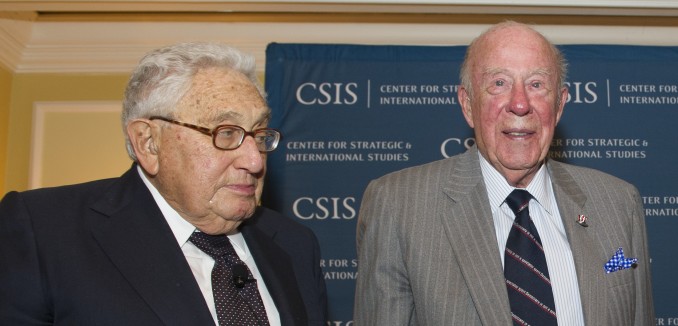A nuclear deal that frees Iran from sanctions but doesn’t address its destabilizing behavior in the Middle East “risks empowering Iran’s hegemonic efforts,” former Secretaries of State Henry Kissinger and George Shultz argued in an op-ed (Google link) published today in The Wall Street Journal.
Kissinger and Shultz noted that, if the announced parameters of the Joint Comprehensive Plan of Action are followed, they would limit the amount of nuclear material Iran has, but the ambiguities and uncertainties in the plan would make enforcement “daunting.”
Despite these observations and reservations, Kissinger and Shutz’s primary aim in writing was to warn of the threat that a future deal would pose to the Middle East:
Some advocates have suggested that the agreement can serve as a way to dissociate America from Middle East conflicts, culminating in the military retreat from the region initiated by the current administration. As Sunni states gear up to resist a new Shiite empire, the opposite is likely to be the case. The Middle East will not stabilize itself, nor will a balance of power naturally assert itself out of Iranian-Sunni competition. (Even if that were our aim, traditional balance of power theory suggests the need to bolster the weaker side, not the rising or expanding power.) Beyond stability, it is in America’s strategic interest to prevent the outbreak of nuclear war and its catastrophic consequences. Nuclear arms must not be permitted to turn into conventional weapons. The passions of the region allied with weapons of mass destruction may impel deepening American involvement.
If the world is to be spared even worse turmoil, the U.S. must develop a strategic doctrine for the region. Stability requires an active American role. For Iran to be a valuable member of the international community, the prerequisite is that it accepts restraint on its ability to destabilize the Middle East and challenge the broader international order.
Until clarity on an American strategic political concept is reached, the projected nuclear agreement will reinforce, not resolve, the world’s challenges in the region. Rather than enabling American disengagement from the Middle East, the nuclear framework is more likely to necessitate deepening involvement there—on complex new terms. History will not do our work for us; it helps only those who seek to help themselves.
In arguing that a change in Iranian behavior is an essential part of an effective nuclear deal, Kissinger and Shultz echoed an argument made by Israeli Prime Minister Benjamin Netanyahu, who said in an interview with NBC that “The important thing is that the lifting of restrictions on Iran’s nuclear program would depend on Iran’s change of behavior, that it would stop supporting terrorism, stop its aggression against just about every country in the region and stop calling, stop threatening the annihilation of Israel.”
Nuclear experts Olli Heinonen and Ephraim Asculai recently pointed problems with enforcing the emerging deal, similar to the concerns outlined by Kissinger and Shultz.
[Photo: Center for Strategic & International Studies / flickr ]




